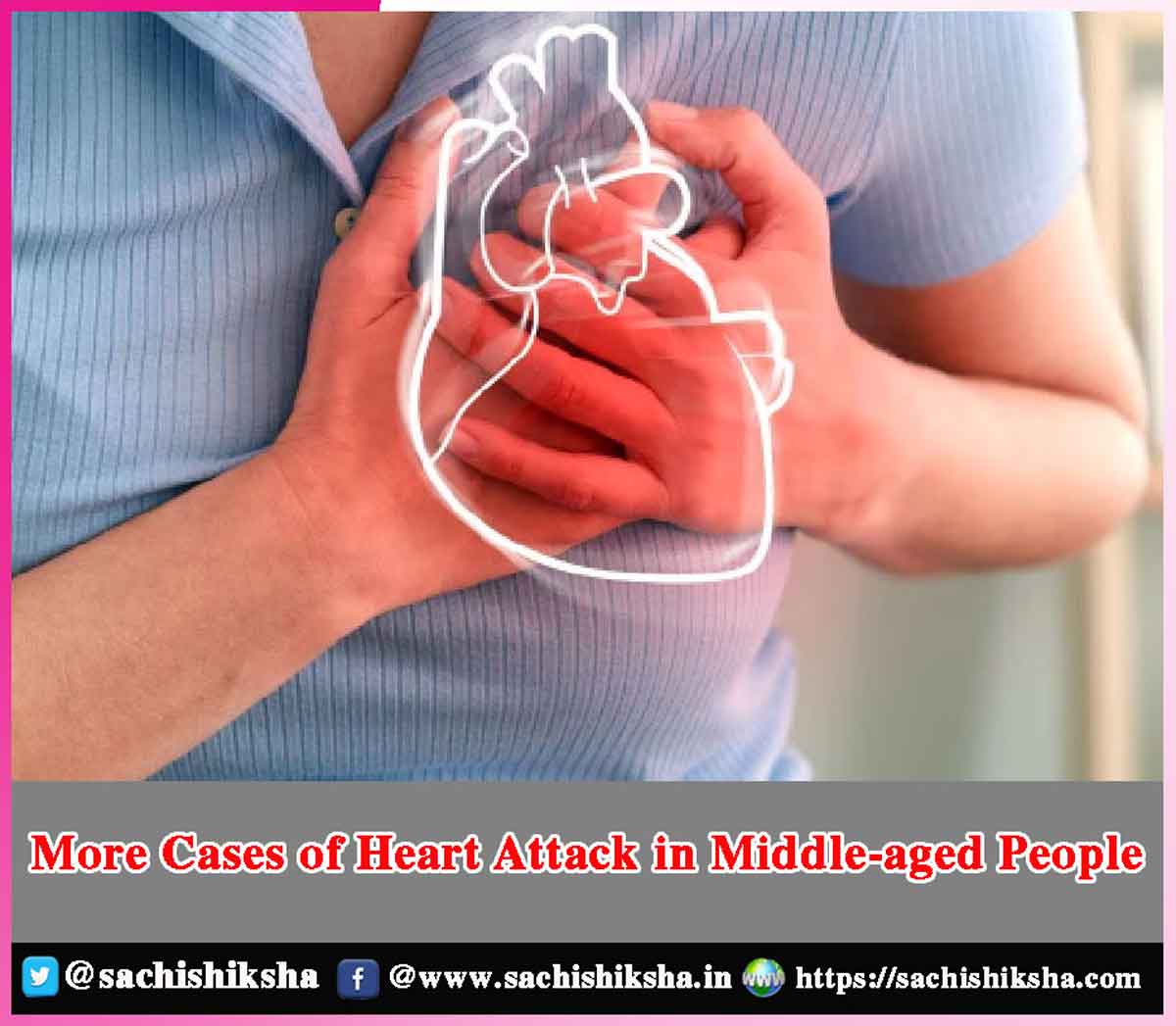More Cases of Heart Attack in Middle-aged People
Introduction: In recent decades, heart disease has emerged as a significant health crisis, especially among middle-aged individuals. This demographic, often considered to be in the prime of their lives, is witnessing a disturbing rise in heart attack cases. Various factors contribute to this trend, including lifestyle choices, dietary habits, mental health issues, and increasing stress levels. This article delves into the reasons behind the rising incidence of heart attacks in middle-aged individuals, explores the risk factors involved, discusses preventative measures, and highlights the importance of early detection and intervention.

Table of Contents
Current Statistics

Risk Factors for Heart Attacks in Middle-Aged Individuals
Lifestyle Choices:
- Sedentary Lifestyle: The shift towards a more sedentary lifestyle, exacerbated by technological advancements and urbanization, has contributed to the rising incidence of heart attacks. Many people spend long hours at desks or engaging in passive leisure activities, such as watching television or browsing the internet, leading to a lack of physical activity. Regular exercise is crucial for maintaining cardiovascular health, and its absence increases the risk of obesity, hypertension, and diabetes—key contributors to heart disease.
- Poor Dietary Habits: Diet plays a vital role in heart health. The prevalence of processed foods high in saturated fats, sugars, and sodium has surged, particularly among middle-aged individuals. Diets rich in unhealthy fats and sugars can lead to obesity, high cholesterol levels, and hypertension. Conversely, diets low in fruits, vegetables, whole grains, and lean proteins fail to provide the nutrients necessary for heart health.
- Tobacco Use and Alcohol Consumption: Despite increased awareness of the dangers of smoking, tobacco use remains a significant risk factor for heart attacks. Additionally, alcohol consumption can lead to hypertension and other health complications that increase the risk of heart disease. Both behaviors contribute to the growing incidence of cardiac events among middle-aged individuals.
Mental Health Issues:
Mental health has a significant effect on your physical well-being. Stress, anxiety, and depression have been linked to an increased risk of heart disease. The pressures of work, family responsibilities, and financial concerns can lead to chronic stress, which can, in turn, cause physiological changes that increase the likelihood of heart attacks. Furthermore, individuals experiencing depression may neglect their health, leading to poor lifestyle choices that exacerbate their risk.
- Obesity and Metabolic Syndrome: Obesity rates have soared over the past few decades, with a significant proportion of middle-aged individuals classified as obese. Obesity is a critical risk factor for heart disease, as it is often associated with other conditions such as diabetes and hypertension. Metabolic syndrome, a cluster of conditions that increase the risk of heart disease, includes obesity, high blood pressure, elevated blood sugar, and abnormal cholesterol levels. The rise of metabolic syndrome in the middle-aged population is a concerning trend.
- Family History: Family history plays a significant role in an individual’s risk of experiencing a heart attack. Genetic predisposition to heart disease can significantly increase the likelihood of developing cardiovascular issues, including heart attacks, especially when combined with lifestyle factors. When a family member, particularly a parent or sibling, has a history of heart disease or heart attacks, the risk of heart attack for other family members rises. This increased risk is often due to inherited factors such as cholesterol metabolism, blood pressure regulation, and the way the body processes fats and sugars. Conditions like high blood pressure, high cholesterol, and diabetes can run in families, making it crucial for those with a family history to be vigilant about their heart health.
- Lifestyle Habits: Moreover, lifestyle habits can also be influenced by family history. For instance, families may share similar dietary patterns, levels of physical activity, and stress management techniques, which can either mitigate or exacerbate heart disease risk. For example, if healthy eating and regular exercise are not prioritized in a family, the likelihood of developing heart disease can increase significantly.
- Awareness of Family History: Awareness of family history allows individuals to take proactive measures. Periodic examinations and testing can assist in detecting the earliest symptoms of heart disease. By adopting heart-healthy lifestyle changes—such as maintaining a balanced diet, engaging in regular physical activity, and managing stress—individuals can lower their risk, even if they have a genetic predisposition to heart attacks.
Preventative Measures
Promoting Healthy Lifestyle Choices:
- Regular Exercise: Encouraging middle-aged individuals to engage in regular physical activity is crucial for reducing the risk of heart disease. The American Heart Association encourages at least 150 minutes of aerobic exercise of moderate intensity per week. Exercising promotes weight management, decreases blood pressure, and reduces cholesterol levels.
- Balanced Diet: Adopting a heart-healthy diet is vital for prevention. A dietary regimen high in vegetables and fruits, whole grain foods, and good fats can greatly lower the possibility of heart disease. Reducing salt, sugar, and saturated fat intake is essential for maintaining overall cardiovascular health.
Managing Stress and Mental Health:
Addressing mental health issues is equally important. Encouraging practices such as mindfulness, yoga, and meditation can help individuals manage stress effectively. When you have signs of depressive disorders or anxiety, you should seek assistance in order to maintain both your mental and physical well-being.
Regular Health Check-Ups
Routine medical check-ups are essential for early detection of risk factors associated with heart disease. Regular screenings for blood pressure, cholesterol levels, and blood sugar can help identify individuals at risk and allow for timely interventions.
Education and Awareness:
Raising awareness about the symptoms of heart attacks and risk factors is vital for prevention. Educating middle-aged individuals about the importance of lifestyle choices, mental health, and regular medical check-ups can empower them to take control of their heart health.
Importance of Early Detection and Intervention
Early detection of heart disease is crucial for improving outcomes. Recognizing the symptoms of a heart attack, which may include chest pain, shortness of breath, and discomfort in other areas of the upper body, can save lives. Middle-aged individuals should be educated about these warning signs and encouraged to seek medical attention promptly if they experience them.
Additionally, interventions such as medication to manage cholesterol levels, hypertension, and diabetes can be life-saving. Lifestyle changes combined with medical interventions can significantly reduce the risk of heart attacks in middle-aged individuals.
Conclusion
The increasing incidence of heart attacks in middle-aged individuals is a concerning trend that requires urgent attention. Understanding the risk factors, promoting healthy lifestyle choices, and advocating for mental health awareness are critical steps in addressing this public health crisis. By prioritizing prevention, early detection, and intervention, we can empower middle-aged individuals to take charge of their heart health and reduce the risk of heart attacks. The future of heart health lies in education, awareness, and a commitment to healthier living, ensuring that individuals can enjoy their middle age and beyond with vitality and well-being.












































